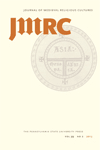
Journal of Medieval Religious Cultures
Scope & Guideline
Advancing Scholarship: Discovering the Rich Tapestry of Medieval Religiosity
Introduction
Aims and Scopes
- Exploration of Religious Texts:
The journal focuses on the critical analysis and edition of medieval religious texts, examining their historical, cultural, and theological significance. - Gender and Religious Practices:
A significant area of focus includes the roles of gender in medieval religious practices, exploring themes of femininity, masculinity, and non-binary identities within religious contexts. - Cultural Interactions and Influences:
The journal investigates the interactions between different cultures and religions during the medieval period, including the influence of Jewish, Christian, and Islamic traditions on each other. - Material Culture and Devotion:
It emphasizes the importance of material culture, including art, artifacts, and architecture, in shaping and expressing medieval religious devotion. - Theoretical and Methodological Innovations:
The journal encourages innovative theoretical approaches and methodologies to the study of medieval religious cultures, fostering interdisciplinary dialogue.
Trending and Emerging
- Intersections of Gender and Identity:
There is a notable increase in the exploration of gender and identity, particularly concerning non-binary and queer interpretations of medieval religious texts and practices. - Affective and Experiential Dimensions of Religion:
Emerging themes focus on the affective and experiential aspects of medieval spirituality, examining how emotions and personal experiences shaped religious practices. - Global Perspectives on Medieval Religiosity:
Recent works are expanding the scope to include non-Western perspectives on medieval religious cultures, highlighting the interconnectedness of global religious traditions. - Materiality and Embodiment in Religious Practices:
There is growing interest in the material aspects of religious devotion, such as art, music, and physical practices, emphasizing the embodied experience of faith. - Cinematic and Modern Interpretations of Medieval Themes:
Scholarly attention is increasingly directed toward how medieval religious themes are represented and reinterpreted in modern media, including film and literature.
Declining or Waning
- Traditional Hagiography:
While hagiography remains relevant, the focus on traditional narratives of saints has decreased in favor of broader explorations of gender, identity, and cultural contexts. - Monastic Life Alone:
The exclusive study of monastic life as a singular theme has waned, with a shift towards examining monasticism in relation to broader societal and cultural dynamics. - Historical Narratives without Critical Context:
There appears to be a decline in interest in purely historical narratives that lack critical engagement with contemporary theoretical frameworks or interdisciplinary approaches.
Similar Journals
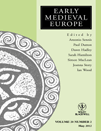
Early Medieval Europe
Fostering Interdisciplinary Dialogues in HistoryEarly Medieval Europe, published by WILEY, is a distinguished academic journal that delves into the multifaceted history and cultural dynamics of the early medieval period in Europe. With an ISSN of 0963-9462 and an E-ISSN of 1468-0254, this journal provides a vital platform for scholars and researchers seeking to share innovative research developments within the field. Covering a range of disciplines including history and arts, it holds a category quartile ranking of Q3 in Arts and Humanities (miscellaneous) and History, alongside Q4 in Geography, Planning, and Development. Notably, it ranks #302 out of 1760 in the Arts and Humanities—History category, reflecting its significance and impact within the scholarly community. While devoted to the promotion of traditional scholarly communication, Early Medieval Europe also welcomes interdisciplinary approaches, making it a valuable resource for students, professionals, and academics interested in insights and advancements related to medieval studies. With an ongoing commitment to meaningful dialogue and exploration, this journal remains a pivotal resource for understanding the complexities of early medieval Europe.
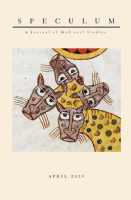
SPECULUM-A JOURNAL OF MEDIEVAL STUDIES
Unveiling the Rich Tapestry of the Middle AgesSPECULUM: A Journal of Medieval Studies, published by University of Chicago Press, stands as a premier academic platform within the field of medieval studies. With an impressive legacy dating back to its inception in 1926, this journal has attracted scholarly contributions that explore the rich tapestry of human experience during the medieval period, encompassing areas such as history, literature, philosophy, cultural studies, and the visual and performing arts. It boasts elite rankings—Q1 in History, Literature and Literary Theory, Religious Studies, and Visual Arts and Performing Arts, with a commendable Q2 in Cultural Studies and Philosophy—attesting to its impact and relevance in academia. Although it is not an open-access journal, the rigorous peer-review process and critical scholarship found within its pages provide invaluable insights for researchers, professionals, and students alike. With a substantial Scopus ranking, ID 0038-7134, and E-ISSN 2040-8072, SPECULUM continues to serve as an essential resource for advancing knowledge and understanding of the medieval world, encouraging interdisciplinary dialogue and scholarly interaction.
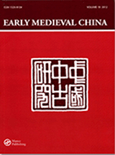
Early Medieval China
Bridging Disciplines to Reveal Early Medieval ChinaEarly Medieval China is a distinguished journal published by ROUTLEDGE JOURNALS, TAYLOR & FRANCIS LTD, specializing in the intricate study of early medieval China through an interdisciplinary lens that encompasses Anthropology, Cultural Studies, History, Literature and Literary Theory, Philosophy, and Religious Studies. With a commendable impact factor and a prestigious standing in various quartile rankings, such as Q1 in Literature and Literary Theory and Q2 in Cultural Studies and History for 2023, this journal serves as a vital resource for scholars, researchers, and students alike. It aims to promote a deeper understanding of China's early medieval period by publishing innovative research, critical essays, and comprehensive analyses that contribute to the broader discourse on Asian studies and history. By offering a platform for cutting-edge research, Early Medieval China plays an essential role in enriching academic dialogue and fostering further explorations in this historically significant field.

Espacio Tiempo y Forma-Serie III-Historia Medieval
Illuminating the Past: Your Gateway to Medieval InsightsEspacio Tiempo y Forma-Serie III-Historia Medieval, published by the Universidad Nacional de Educación a Distancia (UNED), is a prominent open-access journal dedicated to advancing research in medieval history. Since its establishment, this journal has gained a significant reputation within the academic community, achieving Q1 rankings in both Classics and History, reflecting its commitment to high-quality scholarship and insightful contributions to the field. With a remarkable Scopus ranking of 36th in Classics and 589th in History, it places itself among the top-tier publications, ensuring visibility and impact for its authors. Open access since 2011, the journal promotes the dissemination of knowledge to a broader audience, enhancing academic engagement and fostering collaboration among researchers globally. With its rich resources, the journal attracts a diverse readership, including historians, students, and professionals keen on exploring innovative perspectives in medieval studies.
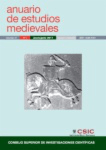
Anuario de Estudios Medievales
Advancing Knowledge in the Realm of the Middle AgesAnuario de Estudios Medievales is an esteemed academic journal dedicated to the field of Medieval Studies, published by the Consejo Superior de Investigaciones Científicas (CSIC) in Spain. With an ISSN of 0066-5061 and an E-ISSN of 1988-4230, the journal has been offering open access to researchers since 1996, fostering a collaborative and inclusive scholarly environment. Recognized for its high impact, it holds a commendable Q1 ranking in History as of 2023, reflecting its influence in the academic community. The journal encompasses a rich array of topics within medieval history, making it a vital resource for historians, scholars, and students alike who seek to explore and understand the complexities of the medieval period. With its indexed presence in Scopus, where it ranks 557th among 1760 in the Arts and Humanities category, Anuario de Estudios Medievales stands as a cornerstone publication, bridging historical inquiry and contemporary research in Medieval Studies.

De Medio Aevo
Championing Academic Excellence in Cultural Studies and BeyondDe Medio Aevo is a distinguished academic journal published by UNIV COMPLUTENSE MADRID, SERVICIO PUBLICACIONES, dedicated to enriching the fields of Cultural Studies, History, Literature and Literary Theory, Philosophy, Religious Studies, and Visual Arts and Performing Arts. Since its inception in 2012 as an Open Access platform, this Spanish journal has rapidly established its reputation, achieving impressive rankings in various categories with a Q1 classification in Literature and Literary Theory and notable positions in Q2 across other fields as per the 2023 metrics. With an emphasis on rigorous scholarly research, De Medio Aevo seeks to foster the exchange of ideas and insights that reflect the rich tapestry of medieval studies and its ongoing impact on contemporary society. It is an essential resource for researchers, professionals, and students alike, encouraging interdisciplinary dialogue and exploration of the cultural narratives that shape our understanding of history and the arts. Located in Madrid, Spain, the journal is committed to making significant contributions to its fields, with a global reach and a focus on academic excellence.

REVUE DE L HISTOIRE DES RELIGIONS
Unveiling the Narratives of Faith Through TimeREVUE DE L HISTOIRE DES RELIGIONS, published by Armand Colin, is a distinguished French journal specializing in the field of Religious Studies. With the ISSN 0035-1423 and E-ISSN 2105-2573, it has been contributing to the academic discourse since its inception. Though it holds a Q4 category within its field, the journal serves as a critical platform for the exploration of historical aspects of various religions, fostering interdisciplinary dialogue among scholars. While access is not provided as an open-access publication, researchers benefit from its comprehensive analyses spanning from 1967, with coverage having originally converged in 1974 and continuously through 2021. With a Scopus rank of #382 out of 584, placing it in the 34th percentile in Arts and Humanities Religious Studies, this journal remains a valuable resource for in-depth historical insight into religious phenomena. It is an essential reading for anyone seeking to enhance their understanding of the complexities of religious history.

Imago Temporis-Medium Aevum
Engaging Minds with the Legacy of the Medieval WorldImago Temporis-Medium Aevum is a distinguished journal published by SPACE POWER & CULTURE- CONSOLIDATED MEDIEVAL STUDIES RESEARCH GROUP, focusing on the rich tapestry of medieval studies within the context of history. Based in the culturally vibrant region of Catalonia, Spain, this journal has established itself as a vital resource for scholars and enthusiasts alike since it adopted an Open Access model in 2007, ensuring that its compelling research is widely accessible. With an impact factor reflected in its Q3 category ranking in the field of History for 2023, and an impressive Scopus rank in the 62nd percentile amongst 1,760 publications, Imago Temporis continues to serve as an incubator for innovative scholarship. The journal's consistent publication history, particularly from 2011 to 2013, 2016 to 2018, and its ongoing commitment through 2024, underscores its dedication to advancing the understanding of the medieval era. Researchers, students, and professionals are encouraged to engage with its unique content, which is poised to challenge traditional perspectives and contribute to the global discourse in medieval studies.

Zbornik Radova Vizantoloskog Instituta
Advancing Scholarship in Classics and HumanitiesZbornik Radova Vizantoloskog Instituta is a distinguished open-access journal published by the Institute of Byzantine Studies, Serbian Academy of Sciences and Arts, located in Belgrade, Serbia. Since its inception in 2003, this journal has served as a vital platform for the dissemination of scholarly research in the fields of Classics, History, Linguistics and Language, and Literature and Literary Theory. Although it currently holds a Q4 ranking in the 2023 category quartiles, its commitment to fostering academic discourse and research accessibility is unwavering. The journal features a diverse range of articles that explore the complexities and nuances of Byzantine studies and related disciplines, catering to a broad audience of researchers, professionals, and students dedicated to the humanities. With a focus on both historical context and contemporary perspectives, Zbornik Radova Vizantoloskog Instituta aims to contribute significant insights into the academic community while promoting scholarly interaction on a global scale.

Religious Studies Review
Exploring the Depths of Faith and ThoughtReligious Studies Review is a prestigious academic journal published by WILEY, serving as a critical platform for scholarly discourse in the field of religious studies. With an ISSN of 0319-485X and an E-ISSN of 1748-0922, the journal has played an influential role in the academic community since its inception, showcasing rigorous research, book reviews, and critical essays that explore various aspects of religion and spirituality. Despite its current categorization as Q4 in the 2023 quartiles, it has a history of sharing valuable insights that provoke thought and foster dialogue among researchers, professionals, and students alike. The journal has undergone several convergence years, indicating its adaptability and ongoing relevance in the ever-evolving landscape of religious studies. While it does not currently offer open access, the wealth of knowledge contained within its pages makes it an essential resource for anyone engaged in the study of religion, particularly in the context of contemporary societal issues. Located at 111 River St, Hoboken, NJ, this journal continues to contribute to the academic discourse through its comprehensive reviews and analyses, solidifying its position as a must-read publication in the field.